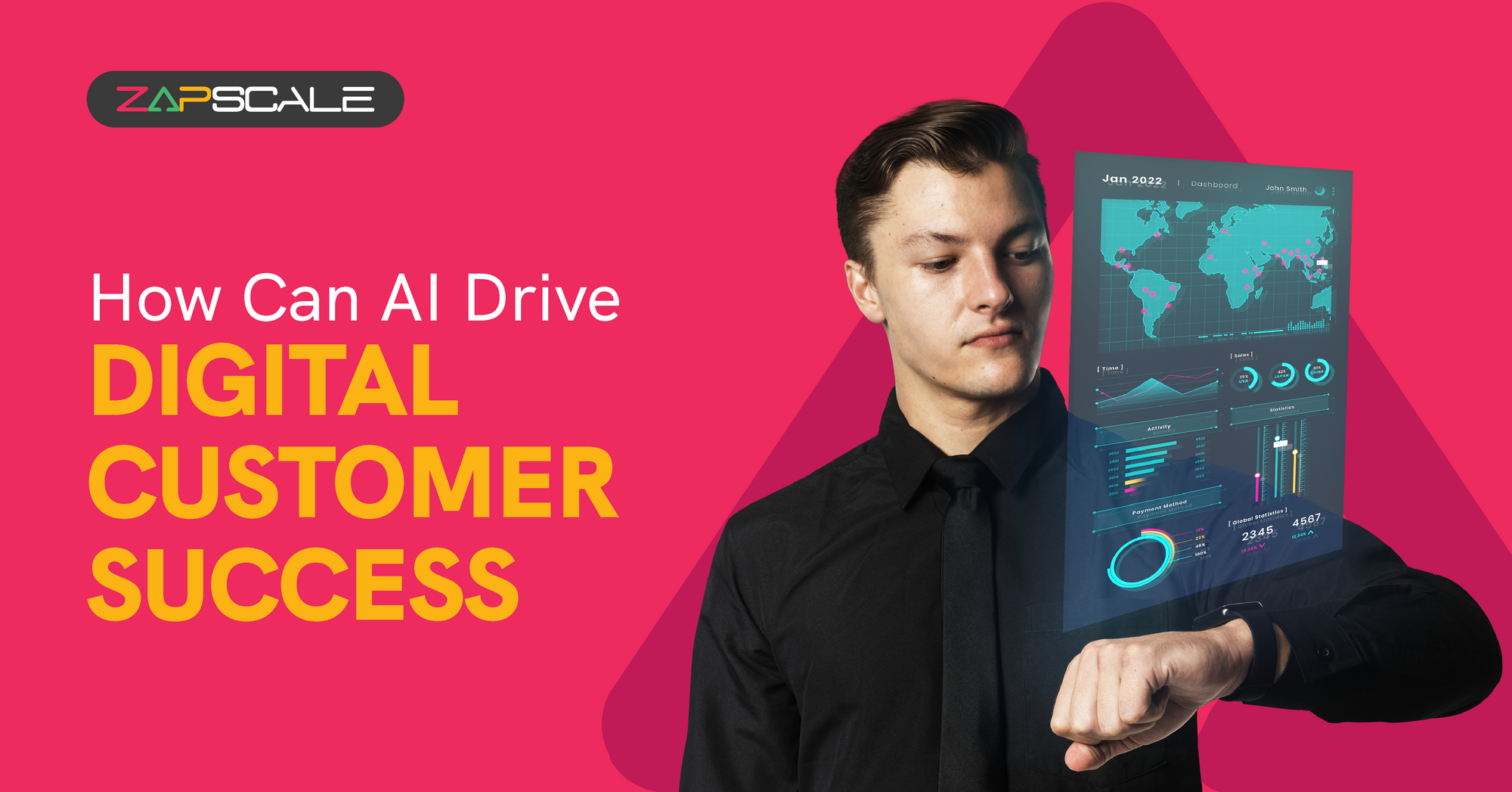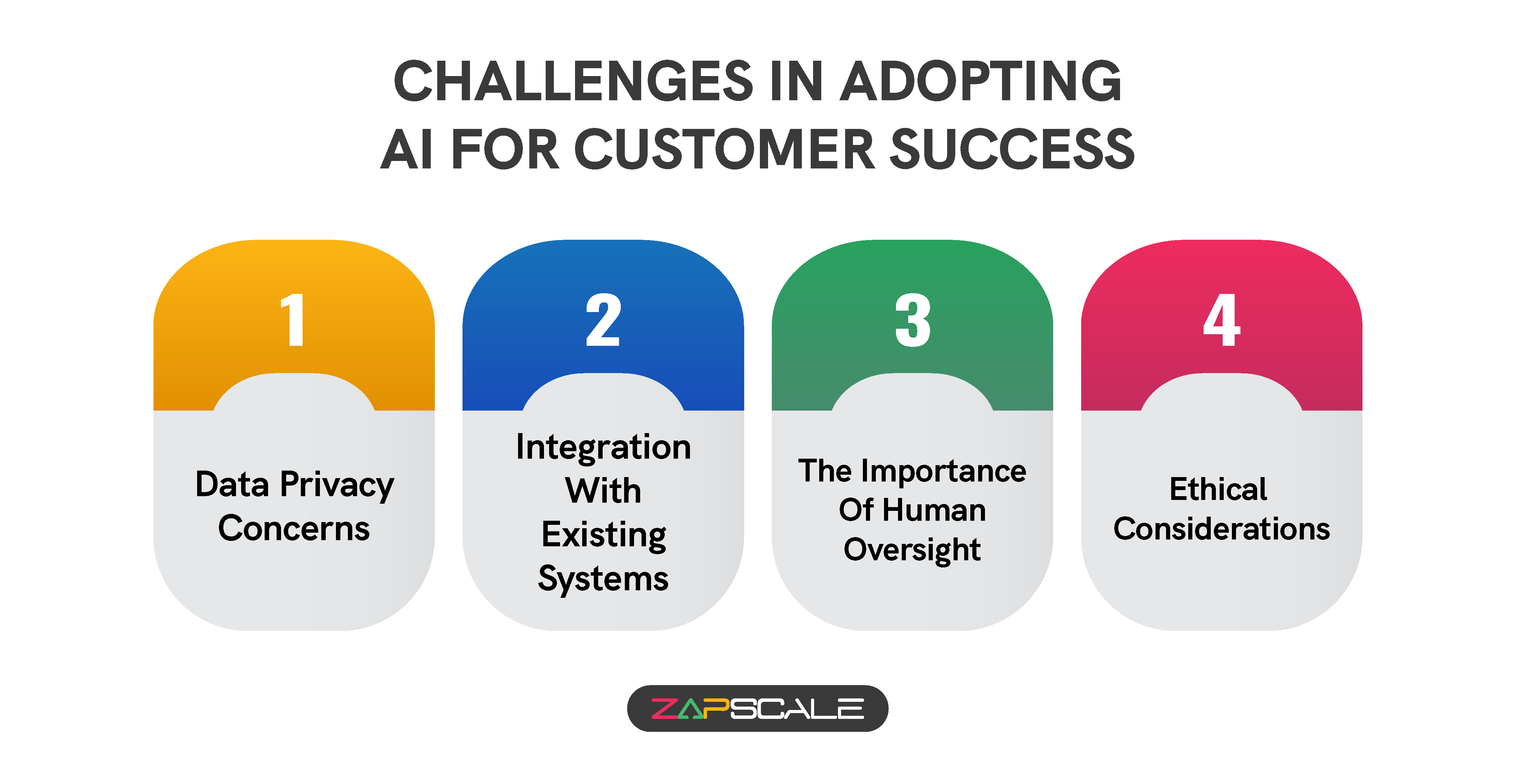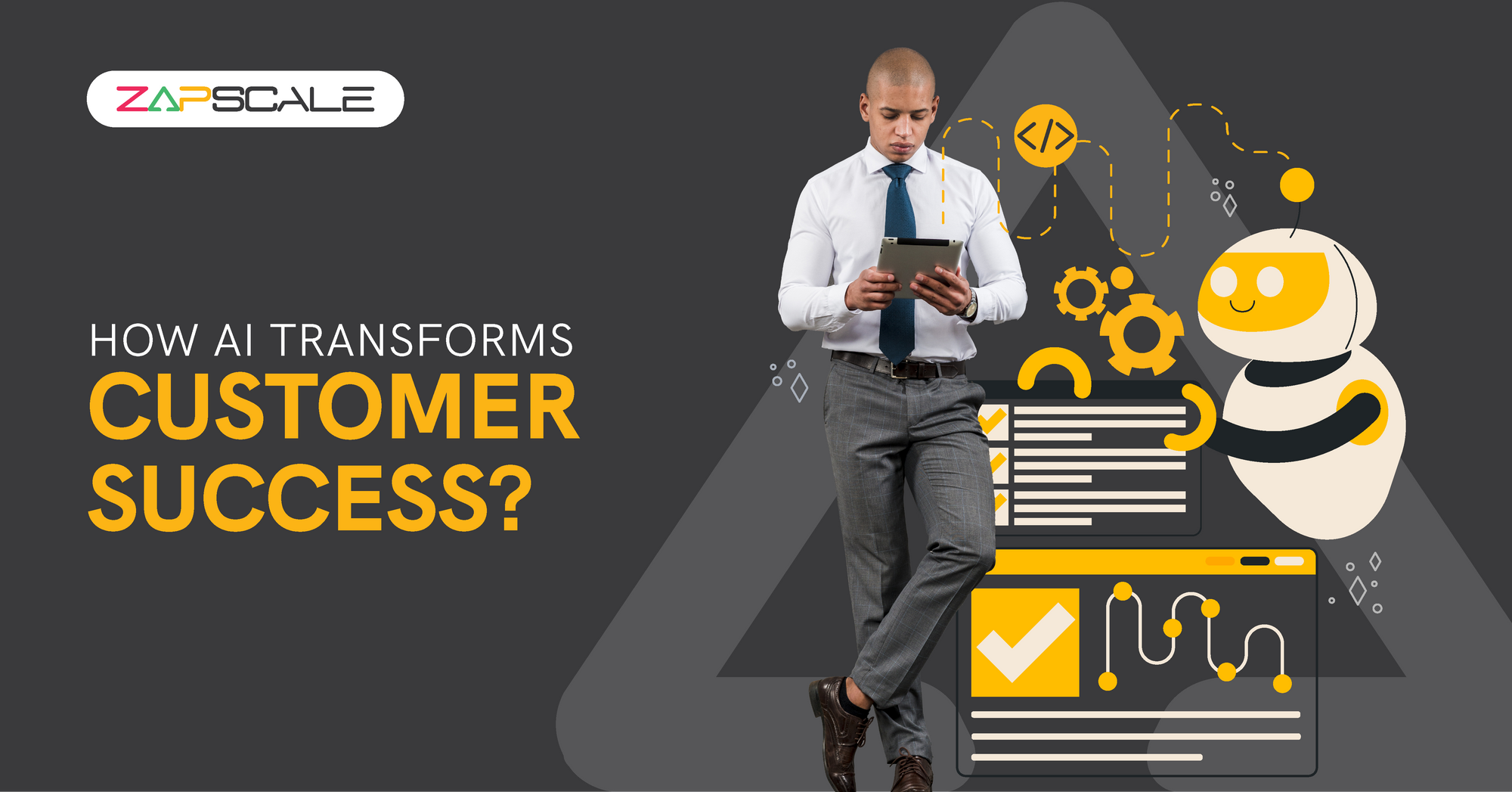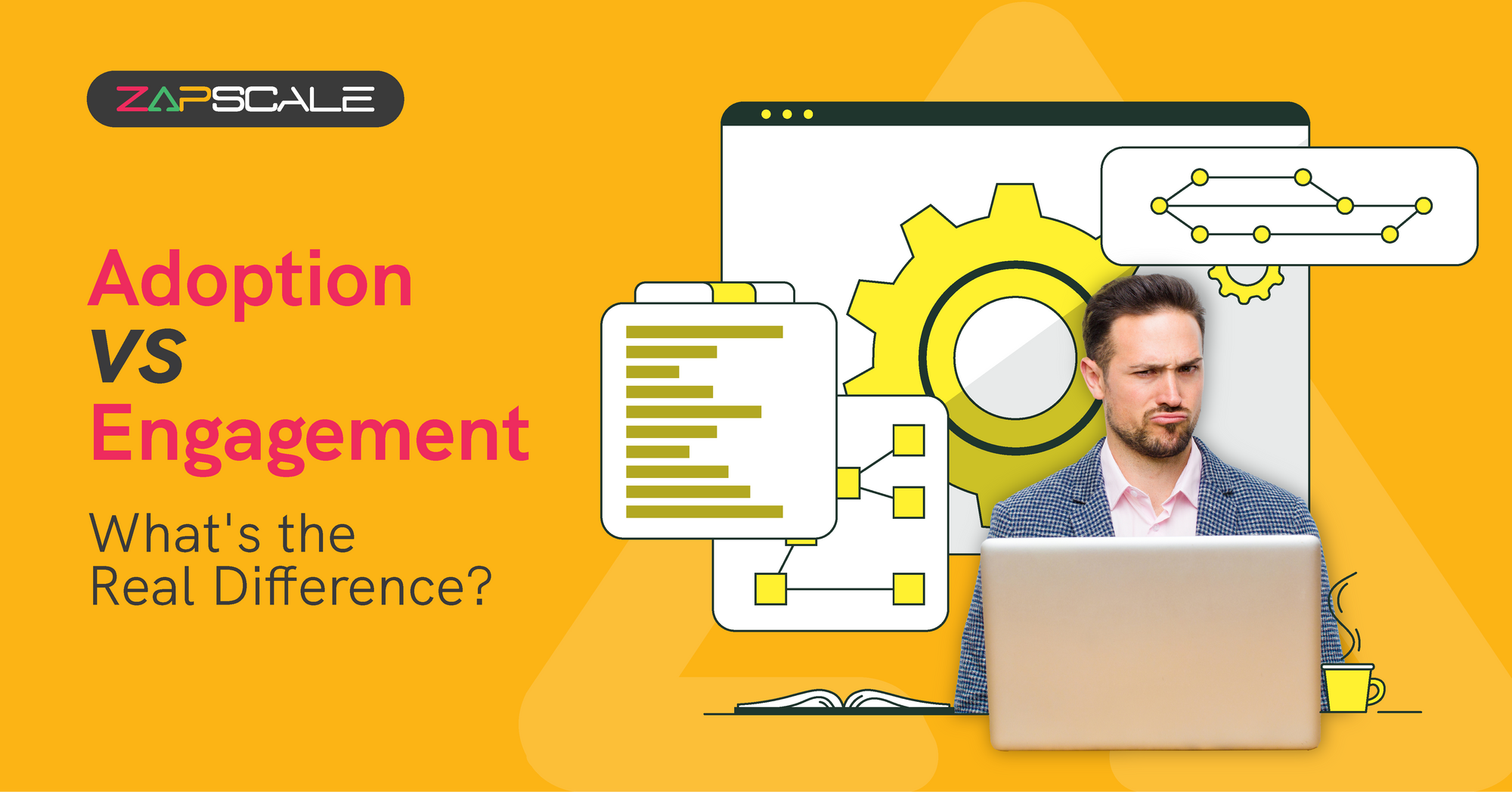CATEGORY > Artificial Intelligence
How AI Can Drive Digital Customer Success

Introduction To AI In Customer Success
The SaaS industry has undergone significant changes in recent years, and one of the most impactful developments I've observed is the growing role of artificial intelligence in customer success practices.
In my previous role as VP of customer success, I saw firsthand how AI is reshaping our approaches and strategies. This article outlines how AI is changing digital customer success efforts in the SaaS industry, based on my team's experiences and the broader trends I’ve noticed.
AI refers to computer systems that can perform tasks that typically require human intelligence.
These tasks include learning from experience, understanding natural language, recognizing patterns, and making decisions. In the context of customer success, AI is becoming a useful tool for understanding and meeting customer needs more effectively and efficiently.
4 Factors Driving AI In Customer Success
The rise of AI in customer success is driven by several factors:
1. The increasing amount of customer data we need to process.
2. The need to provide personalized customer experiences at scale.
3. The demand for faster, more efficient customer support.
4. The potential for predictive analytics to prevent customer churn.

As these factors converge, AI is emerging as a significant tool in the field of customer success, offering new ways to understand, serve, and retain customers
AI-Powered Customer Insights
One of the most significant advantages of AI in customer success is its ability to analyze vast amounts of customer data and provide actionable insights.
Here's how we leveraged AI to uncover customer insights:
1. Deep Data Analysis
AI systems can process and analyze enormous volumes of customer data from various sources, including:
● Customer interactions (emails, chats, phone calls)
● Product usage patterns
● Purchase history
● Social media activity
● Support tickets
By examining this data, AI can identify patterns and trends that might be invisible to human analysts or too time-consuming to discover manually. In my opinion, the use of AI in this manner alone allowed us to understand our customers' needs and behaviors much more deeply than before.
2. Predictive Analytics
AI doesn't just look at historical data; it can also predict future outcomes. By analyzing past behavior and current trends, AI can forecast:
● Which customers are at risk of churning
● Which features or products a customer is likely to adopt next
● When a customer might need additional support or training
These predictions allowed my team to take proactive measures to improve customer satisfaction and retention. For example, we were able to reach out to at-risk customers before they even considered leaving, often turning potential churn into renewed customer engagement.

3. Personalized Recommendations
Based on its analysis, AI can generate personalized recommendations for each customer. In our case, this included:
● Product features that align with the customer's needs
● Training resources tailored to the customer's skill level and usage patterns
● Upsell or cross-sell opportunities that genuinely benefit the customer
By delivering these targeted recommendations, we were able to provide more value to each customer, increasing satisfaction and loyalty.
4. Sentiment Analysis
AI can analyze customer communications to gauge sentiment and emotional tone. This capability allowed my team to:
● Identify customers who may be frustrated or unhappy
● Understand how customers feel about specific features or changes
● Track overall customer satisfaction trends over time
With this information, we addressed issues quickly and made informed decisions about product development and customer engagement strategies.
Automation of Routine Tasks
Another significant benefit of AI in customer success is its ability to automate many routine tasks. This automation freed up my team members to focus on more complex, high-value activities. Here are some areas where we saw AI make a big impact:
1. Responding To Common Questions
AI-powered chatbots can handle a large portion of common customer questions! They can:
● Provide instant responses 24/7
● Answer frequently asked questions
● Guide users through simple troubleshooting steps
● Direct more complex issues to human support agents when necessary
By handling these routine questions, AI helped us reduce response times and improve overall customer satisfaction.
2. Streamlining Onboarding
AI allowed us to automate many aspects of the customer onboarding process, such as:
● Sending welcome emails and setup instructions
● Providing personalized product tours based on the customer's role or needs
● Tracking progress and sending reminders for incomplete steps
● Identifying when a customer might need additional help or training
This automated approach ensured a consistent onboarding experience for all our customers while allowing for personalization based on individual needs.
3. Automated Follow-ups
Automated Follow-ups
AI helped us manage routine follow-ups with customers, including:
● Sending check-in emails at predetermined intervals
● Requesting feedback after key milestones or interactions
● Reminding customers about unused features or upcoming renewals
● Alerting our team when human intervention is needed
These automated follow-ups helped us deliver the same communication to all our customers and allowed the team to focus on specific intervention strategies only.
Proactive Customer Support
One of the most valuable applications of AI in customer success that I've observed is its ability to provide proactive support. By monitoring various indicators of customer health, AI can prevent issues before they escalate. Here's how:
1. Monitoring Customer Health Scores
AI systems can continuously calculate and update customer health scores based on multiple factors, such as:
● Product usage frequency and depth
● Support ticket volume and resolution times
● Engagement with training resources
● Contract renewal dates
● Recent feature adoption
By tracking these scores, AI can alert teams to potential problems early on.
2. Early Warning Systems
AI can detect subtle signs that a customer may be at risk of churning or experiencing difficulties. In our case, these included:
● Decreased login frequency
● Reduced usage of key features
● Increased support ticket volume
● Negative sentiment in recent communications
When these warning signs are detected, the system triggers alerts to our team, allowing us to intervene quickly.
3. Personalized Engagement Recommendations
Something that we started implementing before I left the company was having AI suggest the best times and methods for engaging with each customer based on their past behavior and preferences. For example, recommending:
● The optimal time to reach out for a check-in call
● Which team member might be best suited to handle a particular customer
● What type of content or resource the customer might find most valuable
Challenges In Adopting AI For Customer Success
While the benefits of AI in customer success are significant, there are also several challenges to be addressed:

1. Data Privacy Concerns
As AI systems rely on large amounts of customer data, you have to be vigilant about:
● Ensuring compliance with data protection regulations like GDPR and CCPA
● Being transparent with customers about how their data is used
● Implementing strong data security measures to prevent breaches
Failing to address these concerns can lead to a loss of customer trust and potential legal issues.
2. Integration With Existing Systems
Implementing AI often requires integration with existing customer relationship management (CRM) systems, support platforms, and other tools.
In my experience, this integration can be complex and may require:
● Significant time and resources to implement correctly
● Ongoing maintenance and updates
● Training for staff to use the new integrated systems effectively
We've found that careful planning and execution of these integrations is crucial to realizing the full benefits of AI.
3. The Importance Of Human Oversight
While AI can handle many tasks autonomously, human oversight is super important! You need to:
● Regularly review AI-generated insights and recommendations for accuracy
● Step in when AI encounters situations it's not equipped to handle
● Maintain the personal touch that many customers value
Finding the right balance between AI automation and human interaction is key to successful implementation.
4. Ethical Considerations
As AI becomes more prevalent in customer success, think about ethical questions such as:
● How to ensure AI systems don't perpetuate biases
● When to disclose to customers that they're interacting with AI
● How to handle situations where AI recommendations might conflict with short-term business goals
Addressing these ethical considerations is necessary for building and maintaining customer trust.
Conclusion
Based on my experience as a VP of customer success, I've seen how AI can significantly impact digital customer success in the SaaS industry. By providing deep customer insights, automating routine tasks, and enabling proactive support, AI can help organizations deliver better customer experiences, increase retention, and drive growth.
However, the adoption of AI in customer success is not without challenges: data privacy concerns, system integration issues, ethical implications of using AI in customer interactions, and the need for ongoing human oversight should be at the top of everyone’s minds.
Despite these challenges, I believe the potential benefits of AI in customer success are too significant to ignore.
As AI technology continues to advance, we can expect to see even more applications that will further shape the field of customer success.
If you're a customer success manager, SaaS professional, or decision-maker in the tech industry, consider looking into how AI might fit into your customer success approach. A well-planned AI strategy could help your organization better serve customers and achieve long-term growth. As the digital landscape evolves, those who effectively use AI in customer success may find themselves better equipped to meet changing customer needs and expectations!
ABOUT THE AUTHOR

Divya Apte
Divya Apte is a Customer Success Leader who has over 15 years of experience working in SaaS, B2B, B2C, and B2G in roles ranging from Software Engineer to Project Manager, and from Strategic Partnership Manager to entrepreneur. As a CS professional, Divya finds joy in demystifying technology for her customers, helping them see quick results, and turning them into advocates.
Connect with her on LinkedIn.
Popular from Artificial Intelligence
Quality Content,
Straight To Your Inbox!
Subscribe for the latest blogs, podcasts, webinars, and events!

Write a Blog
If you have experience in CS and
a flair for writing, we’d love to
feature you.
Write to us on
hello@zapscale.com





